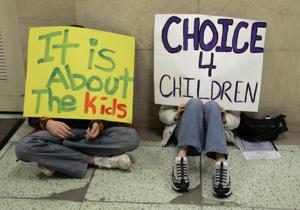School choice expansion measure advances in North Carolina House

(The Center Square) – A bill to expand the state’s private school voucher program advanced Tuesday in the North Carolina House.
House Bill 32, dubbed the Equity in Opportunity Act, would increase funding for school-choice vouchers and allow more students to apply for scholarships. It was approved Tuesday by the House Committee on Education – K-12.
“What this does is rationally peg the state’s per pupil expenditure to these opportunities scholarships that allow these low-wealth and challenged students to participate in what was otherwise only attainable for other wealthy citizens in North Carolina,” said Rep. Dean Arp, R-Union, who presented the bill Tuesday.
The Equity in Opportunity Act would eliminate the current funding cap for North Carolina’s Opportunity Scholarship Program, increasing flexibility for families seeking a private-school education for their children. The program provides state-funded tuition assistance of up to $4,200 a year for private education for low-income students.
According to Private School Review, the average private school tuition in North Carolina in 2021 is about $9,867 a year. Under the bill, scholarship awards would be based on up to at least 70% of the average state per-pupil allocation in the previous fiscal year. It would increase up to 80% in fiscal years 2023 and 2024.
According to the National Education Association’s (NEA) most-recent data, the average per-pupil spending in North Carolina for the 2019-20 school year was $10,632. If the bill becomes law, low-income students could have access to at least $3,200 more for private school tuition, based on the NEA’s estimates. About 11,259 children were awarded Opportunity Scholarship funding at the beginning of the 2020-21 school year, officials said.
The General Assembly approved a measure in September that increased the income threshold to qualify for the scholarship, allowing more students to apply during this school year. The North Carolina Legislature also removed the cap on the number of new awards distributed to students entering kindergarten and first grade.
HB 32 also would allow students entering school from the second grade to qualify for the scholarship program. Current eligibility guidelines open the applications to kindergarteners and first-graders who didn’t attend a North Carolina public school or Department of Defense school in the previous school semester.
The bill also earmarks $500,000 to increase public awareness of the program through a partnership with nonprofit organizations. It allows counties to supplement funding for students receiving the scholarships and those with education savings accounts under the same funding models for charter and traditional public schools.
HB 32 also would revamp the funding model for North Carolina’s education savings account program, which provides up to $9,000 a year for students with disabilities to attend a nonpublic school or home school.
Under the bill, the state would have to base the allocation for eligible full-time students on 85% of the average state per-pupil funding in the previous fiscal year in addition to per-pupil special-needs funding.
School choice was packaged with COVID-19 relief in September, and Democrats in the 2019-2020 legislative session pushed for less funding for the opportunity scholarships. A group of North Carolina parents and teachers also sued the state and the North Carolina State Education Assistance Authority last summer to end the program.
Arp said Tuesday the scholarship program saves North Carolina money on education and evens the playing field for all students.
“What this does is it enables parents to make that choice for themselves,” Arp said. “In fact, people say and said, ‘Well, you know only the elites can go to private schools.’ When the schools have been shut down, they didn’t skip a beat because they were open, and that choice was not available to lower-income children.’ ”
A Civitas poll released in January showed a majority of North Carolinians support school choice. According to the results, 72% of North Carolinians surveyed said they favor creating education savings accounts, and 66% favor the Opportunity Scholarship Program.
HB 32 must pass both chambers of the General Assembly before it is sent to the governor.
Disclaimer: This content is distributed by The Center Square
